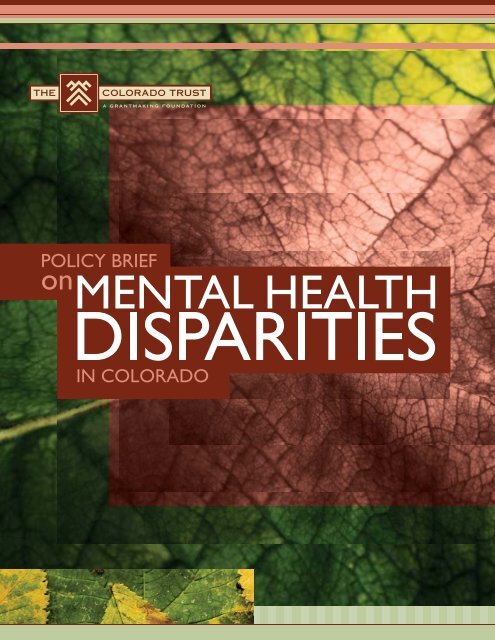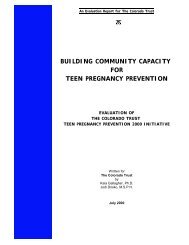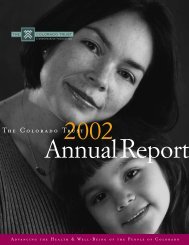Policy Brief on Mental Health Disparities in Colorado â Summary
Policy Brief on Mental Health Disparities in Colorado â Summary
Policy Brief on Mental Health Disparities in Colorado â Summary
- No tags were found...
Create successful ePaper yourself
Turn your PDF publications into a flip-book with our unique Google optimized e-Paper software.
INTRODUCTIONINTENT & CONTENTSThe <str<strong>on</strong>g>Policy</str<strong>on</strong>g> <str<strong>on</strong>g>Brief</str<strong>on</strong>g> <strong>on</strong> <strong>Mental</strong> <strong>Health</strong> <strong>Disparities</strong> <strong>in</strong> <strong>Colorado</strong>was commissi<strong>on</strong>ed by The <strong>Colorado</strong> Trust to <strong>in</strong>form its<strong>on</strong>go<strong>in</strong>g grantmak<strong>in</strong>g activities related to advanc<strong>in</strong>gquality mental health care for the people of <strong>Colorado</strong>.It is based <strong>on</strong> an extensive literature review <strong>on</strong> mentalhealth disparities, <strong>in</strong>put from community members andan advisory group comprised of <strong>Colorado</strong> communitymental health leaders (see list<strong>in</strong>g <strong>on</strong> back page), as wellas recommendati<strong>on</strong>s received from participants <strong>in</strong> the2006 <strong>Colorado</strong> <strong>Mental</strong> <strong>Health</strong> <strong>Disparities</strong> Summit.IMPACT & OPPORTUNITIESGood mental health enables <strong>in</strong>dividuals from allracial and ethnic backgrounds to pursue healthyrelati<strong>on</strong>ships, advance their educati<strong>on</strong>, succeed <strong>in</strong> theworkplace and cope with adversity. The c<strong>on</strong>sequencesof <strong>in</strong>adequate or <strong>in</strong>appropriate mental health services areserious, result<strong>in</strong>g <strong>in</strong> such th<strong>in</strong>gs as an overrepresentati<strong>on</strong>of communities of color <strong>in</strong> government systems like juvenilejustice, crim<strong>in</strong>al justice and child welfare; decreasedproductivity <strong>in</strong> the workplace; <strong>in</strong>creased homelessness; and<strong>in</strong>creased physical health care costs. The effect of mentalillness <strong>on</strong> both quality of life and ec<strong>on</strong>omic productivityexceeds many physical illnesses, such as heart diseaseand diabetes. Impacts <strong>on</strong> quality of life <strong>in</strong>clude failedrelati<strong>on</strong>ships, significant dysfuncti<strong>on</strong> and distress, suicideand suicidal ideati<strong>on</strong>, and limited ability <strong>on</strong> the part ofparents to care for their children. And, lost productivitydue to mental illness cost U.S. employers $105 billi<strong>on</strong> <strong>in</strong>1990 al<strong>on</strong>e.A successful mental health system serves the diverse needsof different racial and ethnic communities by work<strong>in</strong>g withproviders who are l<strong>in</strong>guistically and culturally competent.It also <strong>in</strong>tegrates culturally-traditi<strong>on</strong>al and -specific services,and providers <strong>in</strong>to the ma<strong>in</strong>stream system to address themental health needs of communities of color with<strong>in</strong> thebroader c<strong>on</strong>text of their lives.UNDERSTANDING DISPARITIESUnlike health disparities, studies have shown m<strong>in</strong>imal truedifferences <strong>in</strong> <strong>in</strong>cidence and prevalence rates of mentalillness across racial and ethnic groups. Although there isa lack of effective data <strong>on</strong> mental health disparities, thedata show differences <strong>in</strong> access and utilizati<strong>on</strong> of mentalhealth services across ethnic groups. Additi<strong>on</strong>ally, the studyof historical and current trauma has c<strong>on</strong>nected historicalgenocide, assimilati<strong>on</strong>, oppressi<strong>on</strong> and disparate treatmentto such symptoms as depressi<strong>on</strong>, suicidal thoughts, anger,anxiety, low self-esteem and difficulty <strong>in</strong> both recogniz<strong>in</strong>gand express<strong>in</strong>g emoti<strong>on</strong>s.ACCESS AND UTILIZATION BARRIERSWhat exist<strong>in</strong>g data do show is that – due ma<strong>in</strong>ly toa lack of culturally-ethnic providers and relevant treatment– there exists numerous barriers to both access andutilizati<strong>on</strong>, specifically:• A lack of access to services due to systemic factors,such as the unavailability of private <strong>in</strong>surance, lackof mental health coverage <strong>in</strong> health plans, limitati<strong>on</strong>sof public <strong>in</strong>surance programs, unavailability or lackof fund<strong>in</strong>g for culturally-specific services and thegeographic locati<strong>on</strong> of mental health services• A lack of knowledge of available services• Underutilizati<strong>on</strong> of psychiatric andpsychological services• Problems with treatment engagement and retenti<strong>on</strong>• Misdiagnosis, premature term<strong>in</strong>ati<strong>on</strong> of treatment andself-discharge• Culturally-ethnic <strong>in</strong>appropriate treatments and overuseor -prescrib<strong>in</strong>g of medicati<strong>on</strong>s• Very high rates of substance use disorders and suicide• Increased physical symptoms of mental illness(i.e., somatizati<strong>on</strong>)• Limited availability of <strong>in</strong>terpreters and l<strong>in</strong>guisticallycompetent providers and culturally–traditi<strong>on</strong>al or–specific providers.
POLICY RECOMMENDATIONSMany of the barriers that lead to mental health disparitiescan be addressed through ma<strong>in</strong>stream, as well as culturallytraditi<strong>on</strong>aland -specific services with policy changes <strong>in</strong>f<strong>in</strong>anc<strong>in</strong>g and systems <strong>in</strong>tegrati<strong>on</strong>, educati<strong>on</strong> and directservice delivery, and data and research.FINANCING AND SYSTEMS INTEGRATIONRECOMMENDATIONSThe policy issues most frequently identified by participantsat the 2006 <strong>Colorado</strong> <strong>Mental</strong> <strong>Health</strong> <strong>Disparities</strong> Summitwere f<strong>in</strong>anc<strong>in</strong>g and <strong>in</strong>tegrati<strong>on</strong>. Integrated f<strong>in</strong>anc<strong>in</strong>g<strong>in</strong>cludes reimbursement practices of culturally-traditi<strong>on</strong>al,<strong>in</strong>digenous, faith-based or alternative services with<strong>in</strong> thema<strong>in</strong>stream mental health system. Participants felt thiscould be addressed <strong>in</strong> a variety of ways, <strong>in</strong>clud<strong>in</strong>g thedevelopment of:• Legislati<strong>on</strong> to support payment for culturallytraditi<strong>on</strong>aland alternative services• Methods for <strong>in</strong>tegrat<strong>in</strong>g culturally-traditi<strong>on</strong>alservices with<strong>in</strong> ma<strong>in</strong>stream service delivery• An expanded def<strong>in</strong>iti<strong>on</strong> of health care that<strong>in</strong>cludes holistic health care services <strong>in</strong>tegrat<strong>in</strong>gm<strong>in</strong>d, body and spirit <strong>in</strong> the reimbursementpractices of public and private <strong>in</strong>surance• Pilots to dem<strong>on</strong>strate success of culturallytraditi<strong>on</strong>alor alternative services.Reimbursement and <strong>in</strong>tegrati<strong>on</strong> of culturally-traditi<strong>on</strong>aland other alternative services has been dem<strong>on</strong>strated <strong>in</strong>other states and is supported by the literature, <strong>in</strong>clud<strong>in</strong>g:• In 1998, the Navajo Nati<strong>on</strong> and Carl T. HaydenMedical Center agreed to reimburse traditi<strong>on</strong>alcerem<strong>on</strong>ies through the Veteran’sAdm<strong>in</strong>istrati<strong>on</strong>.• The Yup’ik and Cup’ik Eskimo of SouthwestAlaska fund tundra walks and time with elders,as well as culturally-traditi<strong>on</strong>al treatmentsof mental health and substance abuse, throughMedicaid.• Some social work and div<strong>in</strong>ity schools providecross tra<strong>in</strong><strong>in</strong>g to <strong>in</strong>crease the capacity of clergyand social workers to identify and providemental health services with<strong>in</strong> churches.• Cultural brokers serve as a bridge betweenma<strong>in</strong>stream services and communities of color, andmay help guide the mental health system <strong>in</strong> its effortsto enhance services.Summit participants recommended improv<strong>in</strong>g systems<strong>in</strong>tegrati<strong>on</strong> by remov<strong>in</strong>g f<strong>in</strong>ancial and regulatorybarriers, provid<strong>in</strong>g <strong>in</strong>centives, encourag<strong>in</strong>g collaborati<strong>on</strong>and reward<strong>in</strong>g communities that <strong>in</strong>tegrate and utilizeculturally-traditi<strong>on</strong>al services and best practices. Researchsupports <strong>in</strong>tegrati<strong>on</strong> of services across primary health care,mental health care, substance abuse treatment, educati<strong>on</strong>and other social services and systems of care to meet the<strong>in</strong>dividualized needs of communities of color, as follows:• Recent research str<strong>on</strong>gly supports <strong>in</strong>tegrated treatment,with services provided through <strong>on</strong>e centralizedprovider, or a team of providers, to ensure c<strong>on</strong>sistency<strong>in</strong> treatment plann<strong>in</strong>g and coord<strong>in</strong>ati<strong>on</strong> as the besttreatment resp<strong>on</strong>se.• Specific to diagnostic issues, mental and primaryhealth care providers need to be tra<strong>in</strong>ed to recognizephysical symptoms of mental illnesses. Primary carephysicians should be tra<strong>in</strong>ed <strong>in</strong> early detecti<strong>on</strong> andtreatment and be ready to help patients access services.• In <strong>Colorado</strong>, schools partner with regi<strong>on</strong>almental health centers and private therapiststo provide <strong>on</strong>site services. A Wisc<strong>on</strong>s<strong>in</strong> modelprovides tra<strong>in</strong><strong>in</strong>g <strong>in</strong> educati<strong>on</strong>-based mental health<strong>in</strong>terventi<strong>on</strong>s for therapists located <strong>in</strong> schools.• Policies that address mental health disparities bysupport<strong>in</strong>g social factors, such as Secti<strong>on</strong> 8hous<strong>in</strong>g assistance programs and the Earned IncomeTax Credit, have been shown to help <strong>in</strong> the recoveryof people with mental health needs.• Systems of care create an <strong>in</strong>tegrated, holistic, familycentered, <strong>in</strong>dividualized and culturally-resp<strong>on</strong>siveapproach that build bridges between different systemsand natural supports, provid<strong>in</strong>g services <strong>in</strong> a cultural,family and community c<strong>on</strong>text for <strong>in</strong>dividuals.Additi<strong>on</strong>al f<strong>in</strong>anc<strong>in</strong>g and <strong>in</strong>tegrati<strong>on</strong> areas identifiedby Summit participants <strong>in</strong>cluded:• Complet<strong>in</strong>g a cost-analysis study to look at theimplicati<strong>on</strong>s of health care parity (equal coveragefor mental health and behavioral services with physicalhealth services) through public and private f<strong>in</strong>anc<strong>in</strong>gstreams. The study could help dem<strong>on</strong>strate the needfor an expansi<strong>on</strong> of <strong>Colorado</strong> parity laws. A study <strong>on</strong>Verm<strong>on</strong>t’s parity law found improvements <strong>in</strong> accessto outpatient mental health services, reducti<strong>on</strong> ofspend<strong>in</strong>g <strong>on</strong> mental health and substance abuseservices, and no c<strong>on</strong>sequent <strong>in</strong>crease <strong>in</strong> employersdropp<strong>in</strong>g coverage.• Address<strong>in</strong>g f<strong>in</strong>anc<strong>in</strong>g issues for mental and physicalhealth care services for offenders (<strong>in</strong>dividuals c<strong>on</strong>victedof a state fel<strong>on</strong>y) transiti<strong>on</strong><strong>in</strong>g out of correcti<strong>on</strong>swho currently are <strong>in</strong>eligible for public health <strong>in</strong>surance.Without such health coverage, offenders would notbe able to receive health care services and maypurposefully return to correcti<strong>on</strong>al facilities. In otherstates, <strong>in</strong>clud<strong>in</strong>g New York, Massachusetts and Texas,re-entry programs that provide c<strong>on</strong>t<strong>in</strong>uity of medicati<strong>on</strong>and access to health care after release reduce recidivismand improve <strong>in</strong>dividual outcomes.
EDUCATION AND DIRECT SERVICE DELIVERYRECOMMENDATIONSSummit participants identified the need to enhanceeducati<strong>on</strong> and expand the cultural competency ofthe current and future workforce at all levels of care.Recogniz<strong>in</strong>g that <strong>Colorado</strong>’s cultural competency standardsare limited, participants recommended:• Re-<strong>in</strong>troduc<strong>in</strong>g and strengthen<strong>in</strong>g the 2006 culturalcompetency legislati<strong>on</strong> (Senate Bill 2006-111) by<strong>in</strong>corporat<strong>in</strong>g enhancements to higher educati<strong>on</strong>cultural competency curricula and develop<strong>in</strong>gmarkers for progress toward a more culturallycompetent workforce.• Form<strong>in</strong>g a community-based cultural competencyboard to help develop legislati<strong>on</strong> to m<strong>in</strong>imizethe negative implicati<strong>on</strong>s for communities ofcolor, and review and develop futurelegislati<strong>on</strong> that is culturally competent.• Enhanc<strong>in</strong>g curricula and develop<strong>in</strong>g m<strong>in</strong>imum standardsfor cultural and l<strong>in</strong>guistic educati<strong>on</strong> competency – asvalidated by the research – to:Recognize the historical and socio-politicalimplicati<strong>on</strong>s that are <strong>in</strong>extricably l<strong>in</strong>ked to the mentalhealth and well-be<strong>in</strong>g of communities of color andthe implicati<strong>on</strong>s for diagnosis, treatment and deliveryof culturally appropriate care.Ensure that m<strong>in</strong>imum standards, certificati<strong>on</strong>sand regulati<strong>on</strong>s for cultural and l<strong>in</strong>guistic competencyare clearly articulated <strong>in</strong> c<strong>on</strong>tracts and otheragreements between providers and fund<strong>in</strong>g agencies.For example, <strong>Colorado</strong> currently has no certificati<strong>on</strong>or other regulati<strong>on</strong> of <strong>in</strong>terpretati<strong>on</strong> and translati<strong>on</strong>services, result<strong>in</strong>g <strong>in</strong> the quality and knowledgeof <strong>in</strong>terpreters and translators vary<strong>in</strong>g widelythroughout the system.Assist immigrants’ adjustment to American societyand the tremendous quality of life improvementsthat result from appropriate, early diagnosis andtreatment of mental illnesses.Participants also felt that creat<strong>in</strong>g a more diverseworkforce was necessary to enhance the mental healthof communities of color. In additi<strong>on</strong> to the <strong>in</strong>tegrati<strong>on</strong>of culturally-traditi<strong>on</strong>al and alternative providers <strong>in</strong>to thema<strong>in</strong>stream mental health system, other recommendati<strong>on</strong>sto improve services for communities of color and decreasemental health disparities <strong>in</strong>clude:• Recruitment of more psychiatrists, psychologists andother mental health practiti<strong>on</strong>ers from diverse racialand ethnic backgrounds. States such as Florida, Ohioand Virg<strong>in</strong>ia have developed effective recruitmentprograms for providers of color.• Increased reliance <strong>on</strong> social workers and nurses toexpand the number of racial and ethnic m<strong>in</strong>ority,and female mental health workers, as well asflexible use of n<strong>on</strong>-physician providers, <strong>in</strong>clud<strong>in</strong>greimbursement policies and quality <strong>in</strong>dicators.“The teach<strong>in</strong>gs of our ancestors are very important <strong>in</strong>keep<strong>in</strong>g the circle whole. These teach<strong>in</strong>gs guide thedelivery of care <strong>in</strong> a more holistic and less <strong>in</strong>dividualisticway. The collective approach works because if <strong>on</strong>e pers<strong>on</strong>is sick <strong>in</strong> the family, every<strong>on</strong>e is sick.”
POLICY RECOMMENDATIONS, c<strong>on</strong>t<strong>in</strong>uedDATA AND RESEARCH RECOMMENDATIONSSummit participants recommended c<strong>on</strong>ven<strong>in</strong>g diversestakeholders to develop culturally appropriate guidel<strong>in</strong>es.Stakeholders – <strong>in</strong>clud<strong>in</strong>g universities and communitycolleges, state agencies, providers and communities of color– would develop the guidel<strong>in</strong>es with community <strong>in</strong>put andparticipati<strong>on</strong>, and use them to enhance data collecti<strong>on</strong>,research, evaluati<strong>on</strong> and grant processes. This is key, asresearch f<strong>in</strong>d<strong>in</strong>gs show that:• Historical neglect of cultural issues by researchershas resulted <strong>in</strong> m<strong>in</strong>imal scientific knowledge focus<strong>in</strong>g<strong>on</strong> mental health differences by culture, acculturati<strong>on</strong>and generati<strong>on</strong>al status, race or ethnicity dem<strong>on</strong>strat<strong>in</strong>gthe need for improved research. In <strong>Colorado</strong>, similarissues have resulted <strong>in</strong> some <strong>in</strong>formati<strong>on</strong> be<strong>in</strong>gavailable, but gaps exist due to attempts to simplifyth<strong>in</strong>k<strong>in</strong>g by group<strong>in</strong>g people of color <strong>in</strong>to larger racialand ethnic categories, and the <strong>in</strong>ability to capture datarelated to acculturati<strong>on</strong> and culturally-specific services.• To <strong>in</strong>corporate cultural and l<strong>in</strong>guistic issues fully,research of quality mental health must <strong>in</strong>clude activecollaborati<strong>on</strong> and participati<strong>on</strong> of communitiesof color at every stage of research – <strong>in</strong> the development,analysis, review, recommendati<strong>on</strong>s and dissem<strong>in</strong>ati<strong>on</strong>.Feedback mechanisms for researchers should also be<strong>in</strong>cluded to help them ga<strong>in</strong> <strong>in</strong>formati<strong>on</strong> and share itwith communities so that they, <strong>in</strong> turn, can improveservices. For example, <strong>in</strong> the aftermath of HurricaneKatr<strong>in</strong>a, the <strong>Colorado</strong> Divisi<strong>on</strong> of <strong>Mental</strong> <strong>Health</strong>Services created a partnership between formal andculturally-traditi<strong>on</strong>al mental health providers andsubc<strong>on</strong>tracted with the Black Psychologists Associati<strong>on</strong>to c<strong>on</strong>duct a needs assessment.In additi<strong>on</strong> to the above recommendati<strong>on</strong>s, Summitparticipants identified a range of other policyrecommendati<strong>on</strong>s for further explorati<strong>on</strong>. The full report,<strong>Mental</strong> <strong>Health</strong> <strong>Disparities</strong> <strong>in</strong> <strong>Colorado</strong> (available atwww.coloradotrust.org), explores these recommendati<strong>on</strong>s.<str<strong>on</strong>g>Policy</str<strong>on</strong>g>makers, providers, government and other communityleaders and stakeholders are encouraged to review all ofthe issues and recommendati<strong>on</strong>s as they work together toidentify comprehensive policy soluti<strong>on</strong>s to address mentalhealth disparities <strong>in</strong> <strong>Colorado</strong>.PLEASE NOTE: To view the citati<strong>on</strong>s from the extensiveliterature review used for this <str<strong>on</strong>g>Policy</str<strong>on</strong>g> <str<strong>on</strong>g>Brief</str<strong>on</strong>g> and the fullreport, please see the <strong>on</strong>-l<strong>in</strong>e versi<strong>on</strong>s of these reports(www.coloradotrust.org).
THE COLORADO TRUST is dedicated to advanc<strong>in</strong>g the health and wellbe<strong>in</strong>gof the people of <strong>Colorado</strong>.ADVISORY MEMBERS• Asian Pacific Development Center –Frank Kim, Ph.D. and Carey Ann Tanaka, Ph.D.• Associati<strong>on</strong> of Black Psychologists –Robert L. Atwell, Psy.D.• Associati<strong>on</strong> of Black Psychologists; Denver Chapter –Carnita M. Groves, MA• AstraZeneca – Dyan Alexander, MAS• <strong>Colorado</strong> Asian <strong>Health</strong> Educati<strong>on</strong> and Promoti<strong>on</strong> –Alok Sarwal, Ph.D.• <strong>Colorado</strong> Behavioral <strong>Health</strong>care Council –Doyle Forrestal, JD• <strong>Colorado</strong> Community Church – Pastor Keita Andrews• The <strong>Colorado</strong> Trust – Carol Breslau, MPA andG<strong>in</strong>ger Harrell, BA• Denver Indian Family Resource Center –Isabelle Medchill, LCSW and Theresa Halsey, BA• Divisi<strong>on</strong> of <strong>Mental</strong> <strong>Health</strong>, <strong>Colorado</strong> Department ofHuman Services – Curt Drennen, Psy.D. andJane Crowley• Denver Mayor’s Office for Educati<strong>on</strong> and Children –Susan M. Gallo, Ph.D.• El Centro Esperanza – Maria Evelyn Morreo, MA• Family Agency Collaborati<strong>on</strong>, <strong>Mental</strong> <strong>Health</strong> Center ofDenver – Deborah Ward-White, LCC• Federati<strong>on</strong> of Families for Children’s <strong>Mental</strong> <strong>Health</strong>;<strong>Colorado</strong> Chapter – Lily Boyce• Office of <strong>Health</strong> <strong>Disparities</strong>, <strong>Colorado</strong> Department ofPublic <strong>Health</strong> and Envir<strong>on</strong>ment – Cerise Hunt, MSW• Research Evaluati<strong>on</strong> Associates for Lat<strong>in</strong>os –Theresa Rosner-Salazar, Psy.D.• University of <strong>Colorado</strong> at Denver and <strong>Health</strong> SciencesCenter & <strong>Colorado</strong> Psychological Associati<strong>on</strong> –Chad Morris, Ph.D. and Cynthia Wang-Toxby, Psy.D.The research, outreach and writ<strong>in</strong>g of thispublicati<strong>on</strong> was a partnership between:The Center for Systems Integrati<strong>on</strong> (CSI)Pilar Ingargiola, MPH; Denise McHugh, JD; Jewlya Lynn,BA; Melissa Guzman, MSW - a public policy th<strong>in</strong>k tank thatbr<strong>in</strong>gs together research with <strong>in</strong>put from communities,policymakers, leaders and the public to f<strong>in</strong>d soluti<strong>on</strong>s tocomplex policy problems (www.csi-policy.org)andBridg<strong>in</strong>g Cultures, Improv<strong>in</strong>g PerformanceLucy Trujillo, BS - a c<strong>on</strong>sultancy work<strong>in</strong>g to developand implement a process of organizati<strong>on</strong>al changefor improv<strong>in</strong>g the climate for diversity(lucy.trujillo@comcast.net).A special thank you to AstraZeneca for its support of the2006 <strong>Colorado</strong> <strong>Mental</strong> <strong>Health</strong> <strong>Disparities</strong> Summit.The <strong>Colorado</strong> Trust1600 Sherman StreetDenver, <strong>Colorado</strong> 80203www.coloradotrust.org“The <strong>Colorado</strong> Trust” is registeredas a trademark <strong>in</strong> the U.S. Patentand Trademark Office. CopyrightDecember 2006. The <strong>Colorado</strong> Trust.All rights reserved.The <strong>Colorado</strong> Trust is pleased to have organizati<strong>on</strong>s and <strong>in</strong>dividualsshare its materials with others. To request permissi<strong>on</strong> to excerpt fromthis publicati<strong>on</strong>, either <strong>in</strong> pr<strong>in</strong>t or electr<strong>on</strong>ically please c<strong>on</strong>tact The<strong>Colorado</strong> Trust: 303-837-1200 or recepti<strong>on</strong>ist@coloradotrust.org.










